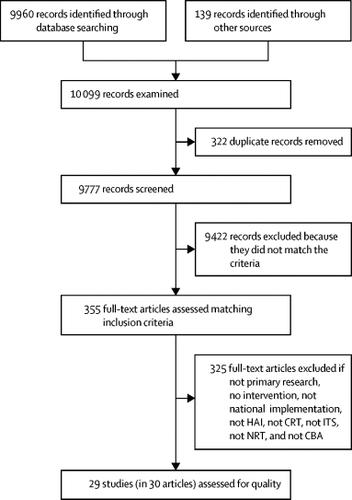Our official English website, www.x-mol.net, welcomes your
feedback! (Note: you will need to create a separate account there.)
Effectiveness of national and subnational infection prevention and control interventions in high-income and upper-middle-income countries: a systematic review.
The Lancet ( IF 98.4 ) Pub Date : 2018-May-01 , DOI: 10.1016/s1473-3099(17)30479-6 Lesley Price 1 , Jennifer MacDonald 1 , Lynn Melone 1 , Tracey Howe 1 , Paul Flowers 1 , Kay Currie 1 , Evonne Curran 1 , Valerie Ness 1 , Debbie Waddell 1 , Sarkis Manoukian 1 , Agi McFarland 1 , Claire Kilpatrick 2 , Julie Storr 2 , Anthony Twyman 2 , Benedetta Allegranzi 2 , Jacqui Reilly 1
The Lancet ( IF 98.4 ) Pub Date : 2018-May-01 , DOI: 10.1016/s1473-3099(17)30479-6 Lesley Price 1 , Jennifer MacDonald 1 , Lynn Melone 1 , Tracey Howe 1 , Paul Flowers 1 , Kay Currie 1 , Evonne Curran 1 , Valerie Ness 1 , Debbie Waddell 1 , Sarkis Manoukian 1 , Agi McFarland 1 , Claire Kilpatrick 2 , Julie Storr 2 , Anthony Twyman 2 , Benedetta Allegranzi 2 , Jacqui Reilly 1
Affiliation

|
Evidence-based guidance for national infection prevention and control (IPC) programmes is needed to support national and global capacity building to reduce health-care-associated infection and antimicrobial resistance. In this systematic review we investigate evidence on the effectiveness of IPC interventions implemented at national or subnational levels to inform the development of WHO guidelines on the core components of national IPC programmes. We searched CENTRAL, CINAHL, Embase, MEDLINE, and WHO IRIS databases for publications between Jan 1, 2000, and April 19, 2017. 29 studies that met the eligibility criteria (ie, economic evaluations, cluster-randomised trials, non-randomised trials, controlled before-and-after studies, and interrupted time-series studies exploring the effective of these interventions) were categorised according to intervention type: multimodal, care bundles, policies, and surveillance, monitoring, and feedback. Evidence of effectiveness was found in all categories but the best quality evidence was on multimodal interventions and surveillance, monitoring, and feedback. We call for improvements in study design, reporting of research, and quality of evidence particularly from low-income countries, to strengthen the uptake and international relevance of IPC interventions.
中文翻译:

高收入和中高收入国家的国家和地方感染预防和控制干预措施的有效性:系统评价。
需要为国家感染预防和控制 (IPC) 计划提供循证指导,以支持国家和全球的能力建设,以减少与医疗保健相关的感染和抗菌素耐药性。在本系统评价中,我们调查了在国家或国家以下各级实施的 IPC 干预措施的有效性的证据,为 WHO 关于国家 IPC 规划核心组成部分的指南的制定提供信息。我们在 CENTRAL、CINAHL、Embase、MEDLINE 和 WHO IRIS 数据库中搜索了 2000 年 1 月 1 日至 2017 年 4 月 19 日之间的出版物。29 项研究符合资格标准(即经济评估、整群随机试验、非随机试验,前后对照研究,以及探索这些干预措施有效性的中断时间序列研究)根据干预类型进行分类:多模式、护理包、政策以及监督、监测和反馈。在所有类别中都发现了有效性的证据,但质量最好的证据是关于多模式干预和监测、监测和反馈的。我们呼吁改进研究设计、研究报告和证据质量,特别是来自低收入国家的证据,以加强 IPC 干预措施的吸收和国际相关性。
更新日期:2018-04-20
中文翻译:

高收入和中高收入国家的国家和地方感染预防和控制干预措施的有效性:系统评价。
需要为国家感染预防和控制 (IPC) 计划提供循证指导,以支持国家和全球的能力建设,以减少与医疗保健相关的感染和抗菌素耐药性。在本系统评价中,我们调查了在国家或国家以下各级实施的 IPC 干预措施的有效性的证据,为 WHO 关于国家 IPC 规划核心组成部分的指南的制定提供信息。我们在 CENTRAL、CINAHL、Embase、MEDLINE 和 WHO IRIS 数据库中搜索了 2000 年 1 月 1 日至 2017 年 4 月 19 日之间的出版物。29 项研究符合资格标准(即经济评估、整群随机试验、非随机试验,前后对照研究,以及探索这些干预措施有效性的中断时间序列研究)根据干预类型进行分类:多模式、护理包、政策以及监督、监测和反馈。在所有类别中都发现了有效性的证据,但质量最好的证据是关于多模式干预和监测、监测和反馈的。我们呼吁改进研究设计、研究报告和证据质量,特别是来自低收入国家的证据,以加强 IPC 干预措施的吸收和国际相关性。











































 京公网安备 11010802027423号
京公网安备 11010802027423号